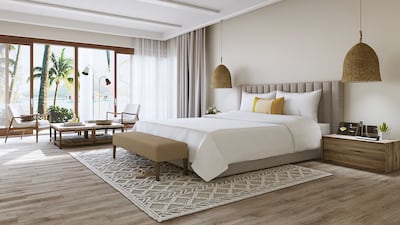Is quality sleep eluding you post pandemic? Are erratic sleep patterns making you toss and turn all night? If so, you may want to consider checking into a luxury hotel to get your full 40 winks in style.
The concept of sleep travel is gaining traction around the world — and it’s little surprise. According to a study by the American Academy of Sleep Medicine, 60 per cent of Americans now suffer from a phenomenon termed “Covid-somnia”, or deficient sleep linked to the Covid-19 pandemic.
Things aren’t much better in other parts of the world. Global studies have highlighted that with sleep deprivation reaching epic proportions since the outbreak of the pandemic, the world’s exhaustion economy — which is made up of underproductive workers due to compromised health — is booming. If not addressed, this could be catastrophic not only for individuals, but also national economies.
In the UAE, a 2022 study of adolescents by the Gulf Medical University in Ajman discovered that 63.2 per cent of participants suffered from sleep issues, in accordance with the Pittsburgh global score for sleep problems. The research by Ajeena Abdul Khader, Shahnaz Koolippulakkal and Shatha Al Sharbatti found high instances of poor sleep quality, short sleep duration, sleep disruption, restless leg syndrome, sleep apnea and insomnia among subjects.
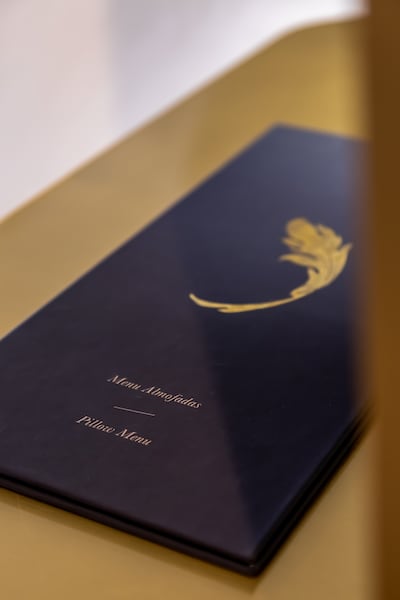
The impact of sleep issues on various other disorders is well documented, including diseases such as hypertension, cardiac failure, heart attacks, cardiac rhythm disorders, strokes, depression, diabetes and obesity in adults.
Waking up to this new need, luxury hotels around the world are launching a range of sleep-related amenities to cater to the demands of a new wellness-attuned traveller. These include curated sleep music, customised mattresses, Ayurvedic fragrances and pillow drops, yoga nidra (a form of restorative guided sleep meditation) and a chef-curated “sleep well menu”, among others.
“More and more properties are focused on travellers who are looking for peace of mind and quality sleep,” says Akshay Chauhan, a yoga and Ayurveda expert. “There’s an emphasis on sleep [since] the Covid-19 era, because so many people struggled with it. Insomnia may be the primary problem, but there’s a strong desire from people for experiences and treatments that aid in rejuvenating slumber, foundational to sound physical and mental health.”
The freshly minted Westin Resort & Spa, Himalayas, is an embodiment of the brand’s wellness approach. Nestled amid 12 lush, mountainous acres along the Shivalik range, at a height of 1,371 metres, the property promotes the brand’s trademark Six Pillars of Wellness, which includes a dedicated “sleep well” vertical. All rooms feature the brand’s Heavenly Bed, Heavenly rain showers and signature White Tea aloe bath amenities.
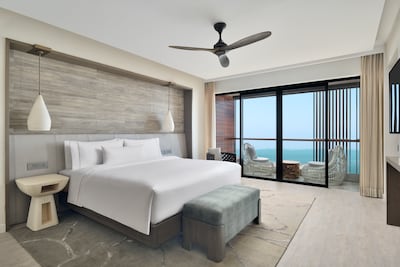
The resort also offers the Sleep Well Lavender Balm, which is infused with calming essential oils such as chamomile.
“The balm can be rolled on to your temples or rubbed on wrists before bedtime to induce uninterrupted sleep. We aim to empower our guests to maintain their wellbeing routines even when they travel,” says Amardeep Singh, the Himalayan property’s general manager.
“Whether they are adjusting to a new time zone or recovering from their travels, restful sleep is the key to wellness. Our assortment of products and programmes ensures that every guest has a sound sleep to prepare for a productive day ahead,” he adds.
Experts say that while demand for good sleep may have existed before, the pandemic has amplified its importance. This has resulted in travellers increasingly looking for wellness retreats where they can achieve their health goals.
In response, the Jehan Numa Palace Hotel in Bhopal, in the central Indian state of Madhya Pradesh, has launched a curated pillow menu. This includes five types of pillows — including microfibre, memory foam, buckwheat hull, siliconised fibre, down and feather.
“For those in the corporate world, especially, work stress and lack of personal time makes slow travel a priority,” says a spokesperson from the hotel. “As the pandemic has impacted the sleep health of so many people, our aim is to provide a relaxing space that not only helps guests sleep better, but also helps them improve their overall health and well-being.”
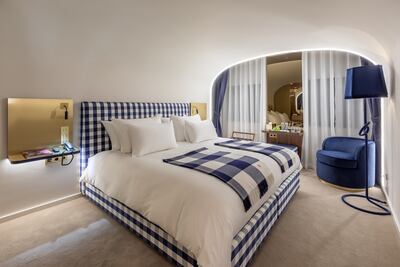
In early 2020, London’s Zedwell became the world’s first sleep-centric hotel, featuring innovative soundproof rooms and AI-powered mattresses. Hastens, the Swedish bed manufacturer, unveiled its first 15-room boutique property, the Hastens Sleep Spa Hotel, in the Portuguese city of Coimbra in 2021. The Park Hyatt New York has launched the Bryte Restorative Sleep Suite, a 900-square-feet “sleep sanctuary” featuring The Restorative Bed by Bryte, a leader in sleep technology.
The Sha Wellness Clinic in Alicante, Spain, offers a seven-day Sleep Recovery Programme, which incorporates natural therapies, technological treatments and nutrition plans that focus on the prevention of insomnia, as well as activities and habits that can be adopted to improve sleep after the programme is done. To compound this focus on better sleep, the pioneering wellness centre recently introduced Hogo “sleep systems” in its presidential suite and two grand suites.
Crafted from materials that protect users from electromagnetic pollution and promote proper thermoregulation, the Hogo bed promises to promote mental balance, reduce oxidative stress, favour cell regeneration and improve the functionality of the immune system.
“The most important thing about Hogo is the patented graphite and silver mesh, which, together with the earthing system, absorbs, channels and eliminates the radiation that the body has acquired throughout the day,” explains Vicente Mera, Sha Wellness Clinic’s specialist in sleep medicine.
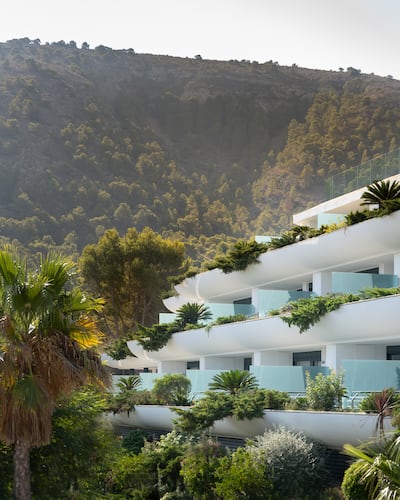
“Beech wood, merino wool, coconut fibre, 100 per cent latex, cashmere and organic cotton are other materials used in the Hogo system, the parts of which are assembled by hand. In addition, it is recommended to install the headboard facing north, according to the principles of feng shui.”
Leveraging the growing demand for slow and wellness travel, Six Senses Hotels has launched a Sleep with Six Senses programme, with the aim of improving sleep patterns, restoring energy levels and establishing sustainable sleep routines.
At Six Senses Zighy Bay, natural, organic, handmade mattresses and cotton bedding, pillow and scent menus, and limited amounts of sound and light pollution all help contribute to quality sleep.

Doctors say that a solid night’s shuteye – seven to nine hours – is vital to both physical and mental health. “Sleep is an essential function that allows our body and mind to heal and recharge, leaving us refreshed, alert and active when we wake up,” says Dr Sanjay Manchanda from the department of sleep medicine at Sir Ganga Ram Hospital in New Delhi.
“Quality sleep also helps the body to remain healthy and disease-free while building our immunity. But the pace of modern life hardly gives us time to stop and rest, and get a good night’s sleep on a regular basis. Digital overexposure is only making things worse.”
The pandemic has wreaked havoc on all our natural cycles, he adds. “We started seeing more cases of mental health issues, depression and anxiety.
“Now that we are coming back to normal life, people are looking for experiences that help them resolve their sleeping patterns, eat healthier and exercise.”
